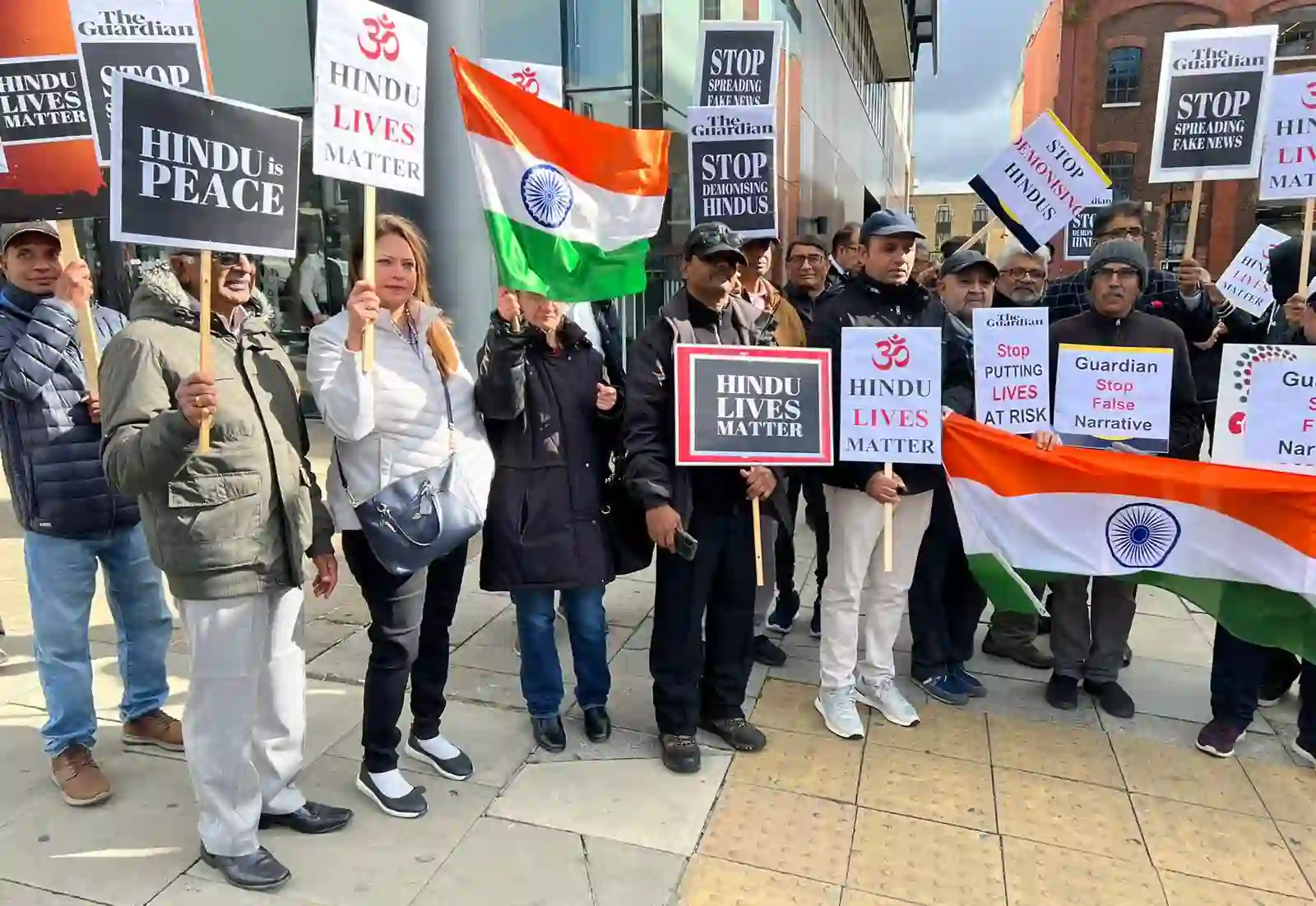

British Hindus hold vigil in front of The Guardian newspaper's London office
In a rather rare piece of action, British Hindus protested in front of The Guardian‘s office at Kings Place in London on Wednesday afternoon. They were “holding a vigil” against what they called “biased coverage” by the newspaper on the Leicester incidents.
The protesters held placards saying, “Stop spreading fake news”, “Stop demonising Hindus” and “Guardian stop false narrative”. One of the placards said: “The Guardian, stop putting lives at risk”, hinting that misleading information by the newspaper could be fuelling attacks against the Hindus in the UK.
Speaking on behalf of the Indian diaspora, Nitin Mehta said: “The Hindu community is being demonised by linking every news story with emotive words like Hindu nationalists and Hindus who demonise other communities. All the stories are biased and downright lies. There is no way to challenge this Guardian narrative as letters offering different views are not published by the paper”.
The protesters also gave a memorandum to Katharine Viner, the editor of The Guardian.
Mehta, one of the organisers of the protest, added: “The Guardians’ anti-India, anti-Hindu narrative is creating hate for Hindus in the UK. We urge The Guardian to tone down its extreme Hindu position failing which we will keep coming to protest and expose the unprofessional Guardian journalism. We are prepared to meet the editorial board to discuss the issue”.
The unrest in Leicester led to injuries to at least 16 policemen—unprecedented in the British society—vandalism of Hindu homes, burning of a temple flag and damage to many cars. The violence dented Leicester’s image of a decades-old harmonious and tranquil city.
The communal violence that carried on for nearly three weeks prompted British Hindus to scrutinise the media’s coverage of the Hindu community and the city. The Hindu residents picked out The Guardian and the BBC for reporting unverified information, thus giving some sort of legitimacy to radical Muslims to intimidate Hindus in Leicester and other British cities.
After much outrage and unraveling of falsehoods, the BBC carried an article admitting that social media lies took them for a ride in Leicester.
The Guardian‘s reportage was found wanting after it amplified a known Islamist like Majid Freeman, describing him as a “community leader”. It also carried rumours that the Bharatiya Janata Party (BJP), India’s ruling party, caused the tensions in Leicester—which was found to be untrue.
Other fake social media posts said: “the RSS ferried Hindus from London”; “a Muslim girl was nearly kidnapped by Hindu youth” and that “a Mosque was attacked by Hindus”. These posts were later disproven by an overwhelmed Leicester Police department and independent researchers.
The social disturbances in Leister and other cities led the British people to debate about ‘assimilation’, ‘multiculturalism’ and ‘British values’.
Some of the British people also pondered over boat landings and more migrants flowing in from Europe through illegal routes. The UK recently signed an agreement with Pakistan to deport migrants with invalid visas and criminal records back to Pakistan.
A press statement by the protesters said: “India which is host to tens of thousands of persecuted groups does not need to be given homilies on being tolerant. The Zoroastrians, Bahai’s, Tibetan Buddhists and Jewish people have lived in India happily for centuries”.
Also Read: Are Hindu families being threatened out of Leicester in a replay of the Kashmir pogrom?
Minister for Electronics and Information Technology Ashwini Vaishnaw said on Friday that the government is…
Renowned human rights activist and political analyst Amjad Ayub Mirza has expressed a strong denunciation…
As was widely expected, the Indian economy grew by 6.5 per cent in real terms…
World No Tobacco Day, marked annually on 31 May, addresses a major public health challenge--the…
Defence Minister Rajnath Singh, addressing officers and sailors onboard India's first indigenous aircraft carrier INS…
The leadership team from the Central Tibetan Administration (CTA) arrived in Tokyo to participate in…